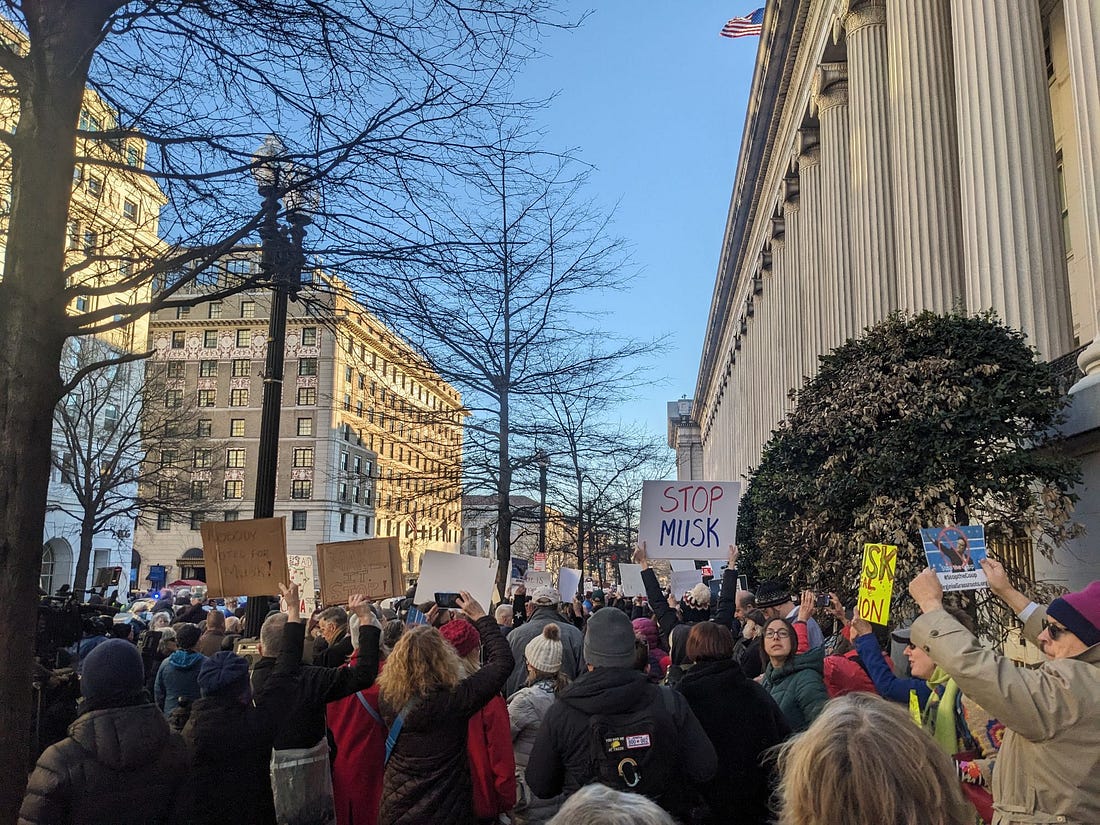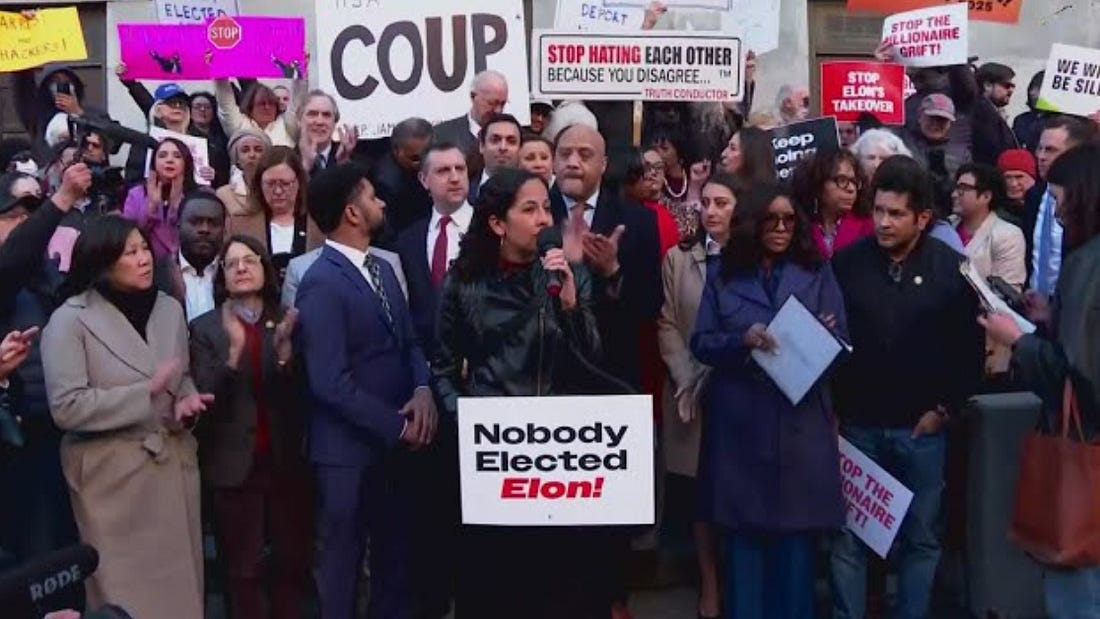|
 |
Is it really a coup if it doesn’t feel like one? If your day-to-day life hasn’t changed? Can it be a coup if I can still write posts like this?
What we’ve seen over the last two weeks and accelerating over the weekend looks like a coup, a hostile, undemocratic takeover of government. Merriam-Webster says a coup is “a sudden decisive exercise of force in politics and especially the violent overthrow or alteration of an existing government by a small group.” No violence so far because this is a coup fueled by tech bros, not the military. But we’re watching the alteration of government happen before our eyes.
Historian Ruth Ben-Ghiat calls it “a new kind of coup,” writing in Lucid about Elon Musk’s seeming power sharing with Trump: “And here is where the U.S. 2025 situation starts to look different. The point of personalist rule is to reinforce the strongman. There is only room for one authoritarian leader at the top of the power vertical. Here there are two.” It is unusual, but it is still an effort to use extra-legal, undemocratic practices to radically alter American democracy, undoing the balance of power the Founding Fathers established between the three branches of government by consolidating power in the hands of the presidency as a complacent, Republican-led Congress looks on.
Monday night, Heather Cox Richardson started her nightly column by explaining that if Republicans wanted to do away with the U.S. Agency for International Development (USAID), the federal agency the Trump administration suddenly shuttered over the weekend, they could do that legally. Republicans now control the White House and Congress. There is a 6-3 majority of justices appointed by Republican presidents on the Supreme Court. But instead of doing it lawfully, with Congress passing a bill for Donald Trump to sign, Richardson writes, “They are permitting unelected billionaire Elon Musk, whose investment of $290 million in Trump and other Republican candidates in the 2024 election apparently has bought him freedom to run the government, to override Congress and enact whatever his own policies are by rooting around in government agencies and cancelling those programs that he, personally, dislikes.”
Richardson concluded: “The replacement of our constitutional system of government with the whims of an unelected private citizen is a coup. The U.S. president has no authority to cut programs created and funded by Congress, and a private citizen tapped by a president has even less standing to try anything so radical.”
So, “coup” is the correct way to label the transformation of government we are living through. But with so much continuing normally, it’s easy to doubt what you’re seeing. Even experiencing it from the perspective of historians who understand this moment through the lens of history, it doesn’t seem quite real.
Reporter Garrett Graff wrote a piece titled, “Musk's Junta Establishes Him as Head of Government,” that he pitched as “Imagining how we'd cover overseas what's happening to the U.S. right now.” He started out like this: “I’ve long believed that the American media would be more clear-eyed about the rise and return of Donald Trump if it was happening overseas in a foreign country, where we’re used to foreign correspondents writing with more incisive authority. Having watched with growing alarm the developments of the last 24 and 36 hours in Washington, I thought I’d take a stab at just such a dispatch.” He concludes that “What started Thursday as a political purge of the internal security services accelerated Friday into a full-blown coup, as elite technical units aligned with media oligarch Elon Musk moved to seize key systems at the national treasury, block outside access to federal personnel records, and take offline governmental communication networks.”
Why damage the American experiment as we near the celebration of its 250th anniversary? Connecticut Democratic Senator Chris Murphy had some thoughts about that as he joined his colleagues outside of USAID’s closed offices on Monday. Suggesting this was not the time to pull punches, he called it a move to benefit the oligarchs who lined the front rows at Trump’s inauguration. “Elon Musk makes billions of dollars based off of his business with China. And China is cheering at [the destruction of USAID]. There is no question that the billionaire class trying to take over our government right now is doing it based on self-interest: their belief that if they can make us weaker in the world, if they can elevate their business partners all around the world, they will gain the benefit.” Senator Murphy also suggested that by closing agencies and cutting back the federal workforce, conservatives could “create the illusion they’re saving money” while they pass giant tax cuts that would benefit “billionaires and corporations.”
Sunday night, I called it a coup as well, writing in exasperation that “Musk and his crew of men barely out of their teens haven’t taken an oath to serve, and they are not accountable to the public. They are not a ‘Department’ of anything. They’re a private army that has taken over. Presidents can set up private advisory groups, but they have to function according to the rules, which include transparency. That’s not what’s happening here.” Worse still, there is little reason to believe that what starts in USAID, Treasury, and the FBI won’t continue to spread to other agencies that are in disfavor with Trump and Musk.
But long-term success is not a foregone conclusion with coups, especially when citizens are unwilling to accept them. Already, we are seeing signs Americans have no intention of letting it happen here. It’s a slow, still-fragile start, but elected officials and American citizens seem to be figuring it out.
The lawyers are at work, too. So far, they’ve convinced courts to enjoin Trump’s birthright citizenship plans and his effort to stop federal spending that offends his sensibilities. Today, lawyers filed two separate cases designed to prevent the FBI from firing agents who worked on January 6 cases and to keep the Justice Department from making their names public. Placing faith in the courts feels like unsteady ground in light of the Supreme Court’s willingness to give Trump a pass on criminality. Having already given him immunity from criminal prosecution for any official acts he commits, perhaps the conservative majority will see the wisdom of declining to consolidate all of the power of government in the hands of the president.
There is still plenty of fight left in our democracy, but it’s an all-hands-on-deck moment. This isn’t a coup with tanks in the streets and mobs overrunning government offices. It’s a quieter coup, a billionaires’ coup. Talk with the people around you about what’s happening and what it means if they’re not aware.
Call it what it is: A coup. Let’s make sure it doesn’t succeed.
We’re in this together,
Joyce
You're currently a free subscriber to Civil Discourse with Joyce Vance . For the full experience, upgrade your subscription.

